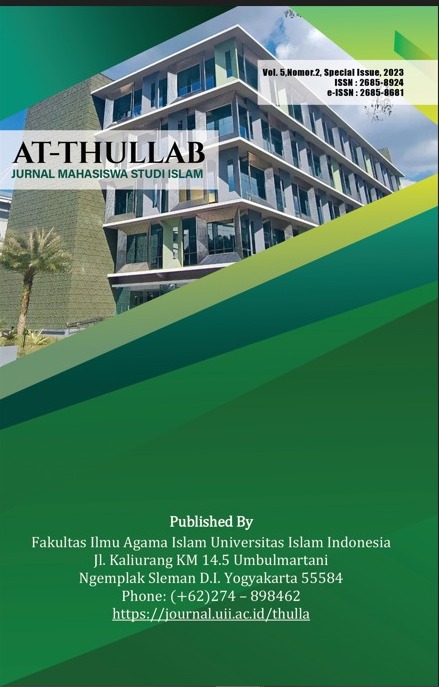Main Article Content
Abstract
The development of information technology takes place rapidly along with the development of an increasingly advanced era. This also has an impact on the ease of access to information anywhere and anytime. The information accessed is not only related to general information, but also information related to religious knowledge. However, not all websites/sites that seek information can be trusted, so accuracy and caution are needed in processing the information obtained. This study aims to find out websites that are used as references for students in studying Islam and students' considerations in believing in the information obtained on these websites.This study uses a descriptive qualitative research method involving students of the Universitas Islam Indonesia from various majors and years. Determination of informants is done through purposive sampling technique and data collected through interviews. Analysis of the data that has been collected is carried out through data reduction, data presentation, and drawing conclusions. The results of this study show that in general there are 7 websites that are used as references for students in studying Islam, including guidanceislam.com, islam.nu.or.id, yotube.com, muslim.or.id, studisyariah.com, rumaysho, suara Muhammadiyah. The reason students trust the information obtained from the website is because the ustadz have an understanding of ahlussunah wal jama'ah and are trusted, the information provided is complemented by aqli arguments, naqli arguments, as well as scientific sanad, relevant to the book being read, and the website used is trusted.
Keywords
Article Details

This work is licensed under a Creative Commons Attribution-NonCommercial-NoDerivatives 4.0 International License.
Authors who publish with this journal agree to the following terms:
- Authors retain copyright and grant the journal right of first publication with the work simultaneously licensed under a Creative Commons Attribution License that allows others to share the work with an acknowledgement of the work's authorship and initial publication in this journal.
- Authors are able to enter into separate, additional contractual arrangements for the non-exclusive distribution of the journal's published version of the work (e.g., post it to an institutional repository or publish it in a book), with an acknowledgement of its initial publication in this journal.
- Authors are permitted and encouraged to post their work online (e.g., in institutional repositories or on their website) prior to and during the submission process, as it can lead to productive exchanges, as well as earlier and greater citation of published work.
References
- “Pengguna Media Sosial Di Indonesia Capai 191 Juta Pada 2022.” n.d. Accessed January 16, 2023. https://dataindonesia.id/digital/detail/pengguna-media-sosial-di-indonesia-capai-191-juta-pada-2022.
- Putra, Rizqi Ananda Dirgantara. 2019. “OSF Preprints _ KEJAHATAN TERORISME BERKEDOK AGAMA DITINJAU DARI ADANYA PENYIMPANGAN LEGITIMASI RELIGIUS BERDASARKAN TEORI PANCASILA.Pdf.”
- Upaya, Covid-, Provinsi Maluku, Julianus Edwin Latupeirissa, John Dirk Pasalbessy, and Elias Zadrak Leasa. 2021. “Jurnal Belo” 6 (c): 179–94.
- Nuraini, T. N. (2022, oktober 17). Contoh Dalil Aqli dan Naqli dalam Ajaran Islam, Pahami Perbedaannya. Retrieved 12 06, 2022, from Merdeka.com: https://www.merdeka.com/trending/contoh-dalil-aqli-dan-naqli-dalam-ajaran-islam-pahami-perbedaannya-kln.html
- Rahmatullah, T. (2018). Hoax Dalam Perspektif Hukum Indonesia. Jurnal Hukum Media Justitia Nusantara, 106.
- Shofiah, N. (2017). Pertimbangan Pemilihan Teks Bacaan Dalam Pengajaran Dan Pembelajaran Membaca. 285.
- Sori Monang, B. S. (2022). Moderasi Beragama di Indonesia:Analisis Terhadap Akidah Ahlu Sunnah Wa Al-Jama’ah. Edukasi Islami: Jurnal Pendidikan Islam, 1023-1024.
- SUHENDRA, A. (2019). Transmisi Keilmuan Pada Era Milenial Melalui Tradisi Sanadan Di Pondok Pesantren Al-Hasaniyah. Jurnal SMaRT Studi Masyarakat, Religi dan Tradisi , 204.
- triadi, Y. (2018, oktober 11). Biografi Ustadz Muhammad Abduh Tuasika. Retrieved 12 24, 2022, from al quran pedia: https://www.alquranpedia.org/2018/10/biografi-ustadz-muhammad-abduh-tuasikal.html
- Zahra, A. M. (2017). Corak Representasi Identitas Ustadz Dalam Proses Transmisi Pendidikan Karakter Di Pesantren. JPII, 29-30.
References
“Pengguna Media Sosial Di Indonesia Capai 191 Juta Pada 2022.” n.d. Accessed January 16, 2023. https://dataindonesia.id/digital/detail/pengguna-media-sosial-di-indonesia-capai-191-juta-pada-2022.
Putra, Rizqi Ananda Dirgantara. 2019. “OSF Preprints _ KEJAHATAN TERORISME BERKEDOK AGAMA DITINJAU DARI ADANYA PENYIMPANGAN LEGITIMASI RELIGIUS BERDASARKAN TEORI PANCASILA.Pdf.”
Upaya, Covid-, Provinsi Maluku, Julianus Edwin Latupeirissa, John Dirk Pasalbessy, and Elias Zadrak Leasa. 2021. “Jurnal Belo” 6 (c): 179–94.
Nuraini, T. N. (2022, oktober 17). Contoh Dalil Aqli dan Naqli dalam Ajaran Islam, Pahami Perbedaannya. Retrieved 12 06, 2022, from Merdeka.com: https://www.merdeka.com/trending/contoh-dalil-aqli-dan-naqli-dalam-ajaran-islam-pahami-perbedaannya-kln.html
Rahmatullah, T. (2018). Hoax Dalam Perspektif Hukum Indonesia. Jurnal Hukum Media Justitia Nusantara, 106.
Shofiah, N. (2017). Pertimbangan Pemilihan Teks Bacaan Dalam Pengajaran Dan Pembelajaran Membaca. 285.
Sori Monang, B. S. (2022). Moderasi Beragama di Indonesia:Analisis Terhadap Akidah Ahlu Sunnah Wa Al-Jama’ah. Edukasi Islami: Jurnal Pendidikan Islam, 1023-1024.
SUHENDRA, A. (2019). Transmisi Keilmuan Pada Era Milenial Melalui Tradisi Sanadan Di Pondok Pesantren Al-Hasaniyah. Jurnal SMaRT Studi Masyarakat, Religi dan Tradisi , 204.
triadi, Y. (2018, oktober 11). Biografi Ustadz Muhammad Abduh Tuasika. Retrieved 12 24, 2022, from al quran pedia: https://www.alquranpedia.org/2018/10/biografi-ustadz-muhammad-abduh-tuasikal.html
Zahra, A. M. (2017). Corak Representasi Identitas Ustadz Dalam Proses Transmisi Pendidikan Karakter Di Pesantren. JPII, 29-30.
